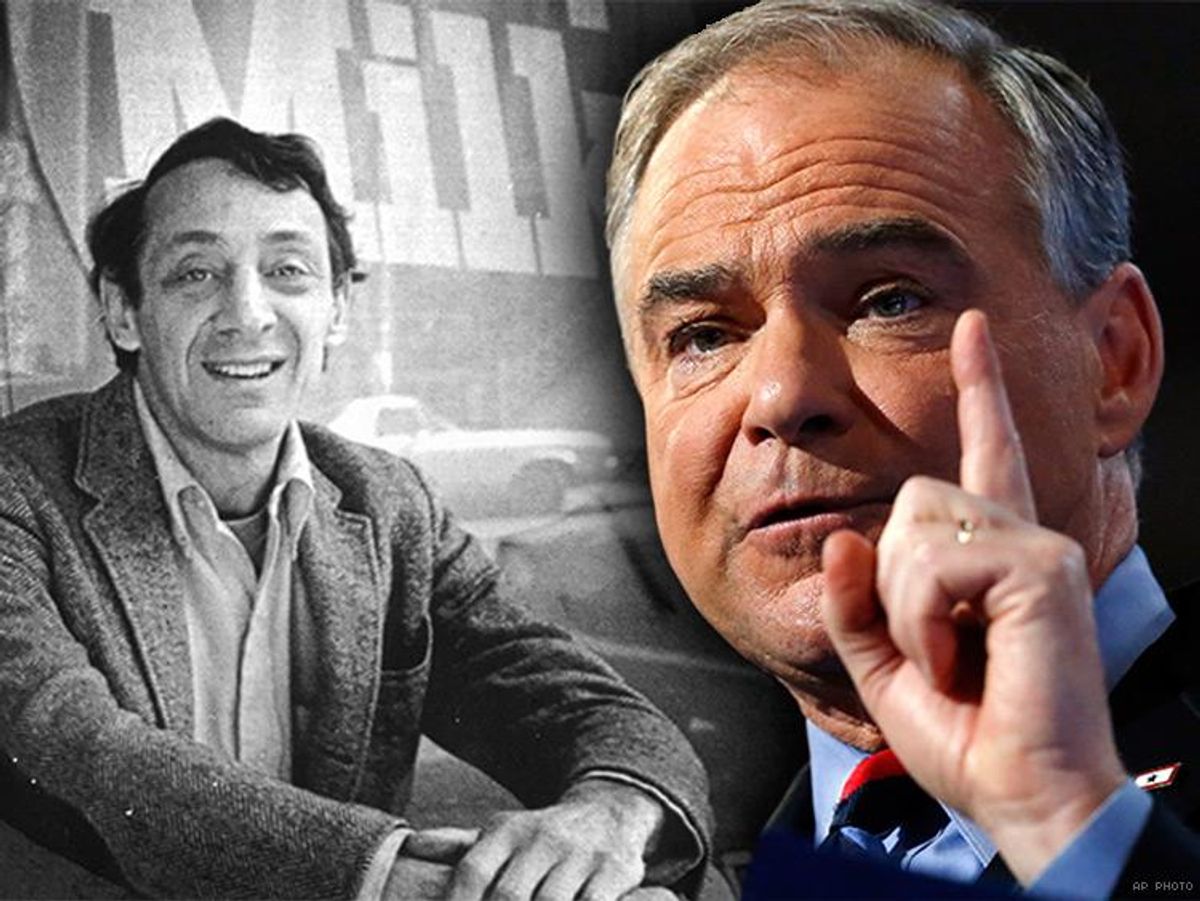Politics
Harvey Milk Made History at the Democratic National Convention

The late gay activist's mention by Tim Kaine marked a milestone in the Democratic Party's embrace of LGBT equality.
July 28 2016 1:47 PM EST
July 28 2016 4:20 PM EST
dnlreynolds
By continuing to use our site, you agree to our Private Policy and Terms of Use.

The late gay activist's mention by Tim Kaine marked a milestone in the Democratic Party's embrace of LGBT equality.
In concluding his speech at the Democratic National Convention, vice presidential candidate Tim Kaine gave a list of historic figures -- presidents, first ladies, visionaries, and activists -- who have helped the United States turn "the next chapter in our great and proud story."
Saying only their first names -- a nod to their iconic stature -- Kaine referenced Thomas Jefferson, Abigail Adams, Woodrow Wilson, Eleanor Roosevelt, John F. Kennedy, Lyndon B. Johnson, Bill Clinton, Martin Luther King, Jr., Cesar Chavez, and Dolores Huerta.
One other name was mentioned, which held particular significance for the LGBT community.
"Martin had a dream and Cesar y Dolores said si se puede. And Harvey gave his life," Kaine said.
The "Harvey" mentioned can be none other than Harvey Milk, the gay San Francisco politician who was assasinated in 1978. His inclusion among this list of pioneers on such a public stage is indicative of just how far the Democratic Party has come in its evolution of embracing LGBT rights.
It's a far cry from even the 2008 convention, when Barack Obama, in accepting the Democratic candidacy, mentioned same-sex marriage but did not endorse it.
"I know there are differences on same-sex marriage, but surely we can agree that our gay and lesbian brothers and sisters deserve to visit the person they love in a hospital and to live lives free of discrimination," Obama said to the applause of the audience.
If there were any "differences" regarding marriage equality at the 2016 convention, they were not on display. In fact, most major speeches from Democrat leaders had at least one moment of recognition for the LGBT community.
Obama set the tone for this shift in language and stance. He was the first to use "evolve" regarding his change of stance toward same-sex marriage, which he embraced in 2012. Moreover, his second inaugural address included the Stonewall riots among the events that shaped the country's civil rights movements. He linked the LGBT uprising to both women's rights (Seneca Falls) and African-American civil liberties (Selma) in both significance and rhetorical assonance.
"We the people declare today that the most evident of truths -- that all of us are created equal -- is the star that guides us still; just as it guided our forebears through Seneca Falls, and Selma, and Stonewall," Obama said in 2013.
This week -- a month after Obama made LGBT history by declaring the Stonewall Inn a national monument--the president's words were echoed by convention speakers.
"From Seneca Falls to the Stonewall Inn, giants stood and said in a chorus of conviction that 'America, we will rise!'" said Sen. Cory Booker in his electrifying Monday address. He added, "Gay or straight ... you are entitled to the full rights and responsibilities of citizenship."
The inclusive message was also conveyed by First Lady Michelle Obama, who, after urging "coming together on behalf of our children," praised "people who lined up in Orlando to donate blood because it could have been their son, their daughter in that club."
It was conveyed by Bernie Sanders, who said Hillary Clinton's "Supreme Court appointments will also defend a woman's right to choose, workers' rights, the rights of the LGBT community."
It was conveyed by former President Bill Clinton, who praised his wife for advocating for "the LGBT community in America and around the world."
It was conveyed by Gavin Newsom, the lieutenant governor of California, who blasted the Republican Party for "the stain of selecting Mike Pence, America's most anti-LGBTQ governor" as well as endorsing the "emotional torture" of "ex-gay" therapy on its platform.
Andre Carson, an Indiana congressman and member of the Congressional Black Caucus, also blasted "Mike Pence's terrible judgment" for fighting "against same-sex couples having equal rights."
Kaine, in addition to honoring Milk, remarked, "We have got to advance opportunity for everybody, no matter ... who you love."
Indeed, the right to "love as we please" was later driven home by Obama in his speech Wednesday night. In addition to including people of varying sexual identities as among the groups who are "stronger together: black, white, Latino, Asian, Native American; young, old; gay, straight; men, women, folks with disabilities," the president praised marriage equality as an American victory.
"Through countless acts of quiet courage, America learned that love has no limits, and marriage equality is now a reality across the land," he declared.
He even cited same-sex marriage as a reason to be hopeful for the country's future.
"Progress does happen," Obama said, adding, "Just ask the Marine who proudly serves his country without hiding the husband that he loves."
Milk -- a politician who also ran on a message of hope and who once said, "If a bullet should enter my brain, let that bullet shatter every closet door" -- would approve.